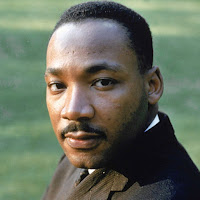Martin Luther King Jr.
Martin Luther King Jr. was a social activist and Baptist minister who played a key role in the American civil rights movement from the mid-1950s until his assassination in 1968. King sought equality and human rights for African Americans, the economically disadvantaged and all victims of injustice through peaceful protest.King was awarded the Nobel Peace Prize in 1964 and is remembered each year on Martin Luther King Jr. Day, a U.S. federal holiday since 1986.
Early Life
Born as Michael King Jr. on January 15, 1929, Martin Luther King Jr. was the middle child of Michael King Sr. and Alberta Williams King. Young Martin had a older sister and a younger brother. Though they undoubtedly tried, Martin Jr.’s parents couldn’t shield him completely from racism.
Martin Luther King Sr. fought against racial prejudice, not just because his race suffered, but because he considered racism and segregation to be an affront to God's will. He strongly discouraged any sense of class superiority in his children which left a lasting impression on Martin Jr.
Martin Luther King Sr. fought against racial prejudice, not just because his race suffered, but because he considered racism and segregation to be an affront to God's will. He strongly discouraged any sense of class superiority in his children which left a lasting impression on Martin Jr.
A gifted student, King attended segregated public schools and at the age of 15 was admitted to Morehouse College, the alma mater of both his father and maternal grandfather, where he studied medicine and law. King then enrolled in a graduate program at Boston University, completing his coursework in 1953 and earning a doctorate in systematic theology two years later.During the work on his doctorate, Martin Luther King Jr. met Coretta Scott, an aspiring singer and musician, at the New England Conservatory school in Boston. They were married in June 1953 and had four children, Yolanda, Martin Luther King III, Dexter Scott and Bernice. In 1954, while still working on his dissertation, King became pastor of the Dexter Avenue Baptist Church of Montgomery, Alabama. He completed his Ph.D. and earned his degree in 1955. King was only 25 years old.
Montgomery Bus Boycott
M
On December 1, 1955, Rosa Parks, secretary of the local chapter of the National Association for the Advancement of Colored People (NAACP), refused to give up her seat to a white passenger on a Montgomery bus and was arrested. Activists coordinated a bus boycott that would continue for 381 days and King was elected to lead the boycott because he was young, well-trained with solid family connections and had professional standing. But the African-American community also took legal action against the city ordinance arguing that it was unconstitutional based on the Supreme Court's "separate is never equal" decision in Brown v. Board of Education. After being defeated in several lower court rulings and suffering large financial losses, the city of Montgomery lifted the law mandating segregated public transportation.
The Southern Christian Leadership Conference
The Southern Christian Leadership Conference
Emboldened by the boycott’s success, in 1957 he and other civil rights activists—most of them fellow ministers—founded the Southern Christian Leadership Conference (SCLC), a group committed to achieving full equality for African Americans through nonviolent protest. In his role as SCLC president, Martin Luther King Jr. traveled across the country and around the world, giving lectures on nonviolent protest and civil rights as well as meeting with religious figures, activists and political leaders.
'I Have a Dream'
In the spring of 1963, Martin Luther King Jr. organized a demonstration in downtown Birmingham, Alabama. Martin Luther King was jailed along with large numbers of his supporters, but the event drew nationwide attention.
By the end of the Birmingham campaign, Martin Luther King Jr. and his supporters were making plans for a massive demonstration on the nation's capital composed of multiple organizations, all asking for peaceful change. On August 28, 1963, the historic March on Washington drew more than 200,000 people in the shadow of the Lincoln Memorial. It was here that King made his famous "I Have a Dream" speech, emphasizing his belief that someday all men could be brothers.
"I have a dream that my four children will one day live in a nation where they will not be judged by the color of their skin but by the content of their character." — Martin Luther King, Jr. / "I Have A Dream" speech, August 28, 1963
The speech and march cemented King’s reputation at home and abroad; later that year he was named “Man of the Year” by TIME magazine and in 1964 became the youngest person ever awarded the Nobel Peace Prize.
Captured on television, the brutal scene outraged many Americans and inspired supporters from across the country to gather in Alabama and take part in the Selma to Montgomery march led by King and supported by President Lyndon B. Johnson, who sent in federal troops to keep the peace. That August, Congress passed the Voting Rights Act, which guaranteed the right to vote—first awarded by the 15th Amendment—to all African Americans.
Assassination
By 1968, the years of demonstrations and confrontations were beginning to wear on Martin Luther King Jr. He had grown tired of marches, going to jail, and living under the constant threat of death. On the evening of April 4, 1968, Martin Luther King was assassinated. He was fatally shot while standing on the balcony of a motel in Memphis, where King had traveled to support a sanitation workers’ strike. In the wake of his death, a wave of riots swept major cities across the country, while President Johnson declared a national day of mourning. The shooter, a malcontent drifter and former convict named James Earl Ray, was eventually apprehended after a two-month, international manhunt.
"I've seen the promised land. I may not get there with you. But I want you to know tonight that we, as a people, will get to the promised land." - Martin Luther King Jr. / "I've Been to the Mountaintop" speech, King's last speech. April 3, 1968.
Martin Luther King Jr.'s life had a seismic impact on race relations in the United States. Years after his death, he is the most widely known African-American leader of his era. Over the years, extensive archival studies have led to a more balanced and comprehensive assessment of his life, portraying him as a complex figure: flawed, fallible and limited in his control over the mass movements with which he was associated, yet a visionary leader who was deeply committed to achieving social justice through nonviolent means.
Sources
http://www.history.com/topics/black-history/martin-luther-king-jr
https://www.biography.com/people/martin-luther-king-jr-9365086
Questions
Sources
http://www.history.com/topics/black-history/martin-luther-king-jr
https://www.biography.com/people/martin-luther-king-jr-9365086
Questions
1. Who was Martin
Luther King Jr.?
a.
A professor
b.
A pastor
c.
A social
activist
d.
A teacher
e.
A good person
2.
Where did King
deliver his most famous speech?
a.
Lincoln Memorial
b.
9/11 Memorial
c.
Liberty Memorial
d.
Trail of Tears
National Historic Trail
e.
Mount Rushmore
3.
Why was Rosa
Parks arrested?
a.
She rebelled
against white people
b.
She punched a
group of white people
c.
She accidentally
sat at the same row of seat with the whites
d.
She refused to
give up her seat to a white passenger at a bus
e.
She disagreed to
a white person opinion
4.
What did Martin
Luther King Sr. fought against? Why?
a.
National war, to
defend his country
b.
Racial
prejudice, because he considered it as an affront to God’s will
c.
Business problem,
because he wants to defend his company
d.
Racial
prejudice, because his race suffered
e.
Political
problem, because it’s his job
5.
What did King
meant from his last speech?
a.
He promised the
people that he will guide them to the promised land
b.
He swore that he
will protect the people against racism
c.
He talked about
his fights and suffering
d.
He encouraged people
to fight against racism
e.
He assured the
people that they will get to the promised land even if he’s not there with
them.



Comments
Post a Comment